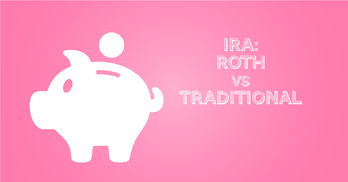 We recently held our annual 401(k) meeting where our investments administrator came to our firm and gave us a presentation on the state of our 401(k). In addition to that information, he answered questions we had about our account or investing. Our investment administrator, explained the differences between the two types of IRA’s, and what we should consider when choosing which retirement account is right for us.
We recently held our annual 401(k) meeting where our investments administrator came to our firm and gave us a presentation on the state of our 401(k). In addition to that information, he answered questions we had about our account or investing. Our investment administrator, explained the differences between the two types of IRA’s, and what we should consider when choosing which retirement account is right for us.
Let us first cover the basics.
Traditional and Roth IRA Basics
The prospect of retirement is an exciting one; however, for several people, the future and retirement may be clouded with uncertainty, worry, and concern. Now is the time to start preparing and ensuring that your financial future is secure.
There are many options to explore when preparing for retirement. Today let’s address two of those options, namely Traditional and Roth Individual Retirement Accounts (IRA’s). What are the differences between these two types of retirement accounts and which option is best for you?
Traditional Individual Retirement Accounts
Q: Who Can Contribute?
A: You can contribute if you (or your spouse, if filing jointly) have earned income/taxable compensation, but not after you are age 70 ½ or older.
Q: Are my contributions tax deductible?
A: You can deduct your contributions if you qualify. Your deduction may be limited if you or your spouse are covered by a retirement plan at work and your income exceeds certain levels (Click on this link for income level thresholds IRA Deductibility Rules). Your deduction is allowed in full if neither you nor your spouse is covered by a retirement plan at work.
Q: How much can I contribute?
A: The most you can contribute to all of your traditional and Roth IRA’s is the smaller of: 1) $5,500 (for 2013 and 2014); 2) $6,500 if you’re age 50 or older by the end of the year; or 3) your taxable compensation for the year.
Q: When can I withdraw my money?
A: You can withdraw money at any time, but if you take a withdrawal before turning 59 1/2, there are likely to be significant penalties. There are exceptions to the penalties, but be careful.
Q: Do I have to take required minimum distributions from my IRA?
A: Yes, you must start taking distributions by April 1 of the following year in which you turn age 70 ½ and by December 31 of subsequent years.
Q: Are my withdrawals and distributions taxable?
A: Any deductible contributions and earnings you withdraw or that are distributed from your traditional IRA are taxable as ordinary income. Also, if you are under age 59 ½ you may have to pay an additional 10 percent tax for early withdrawals unless you qualify for an exception. California has a corresponding 2.5 percent penalty tax as well.
Roth Individual Retirement Accounts
Q: Who Can Contribute?
A: You can contribute at any age if you or your spouse has earned income/taxable compensation and your modified adjusted gross income is below specific amounts.
Q: Are my contributions tax deductible?
A: No, your contributions are not tax deductible.
Q: How much can I contribute?
A: The most you can contribute to all of your traditional and Roth IRA’s combined is the smaller of 1) $5,500 (for 2013 and 2014); 2) $6,500 if you’re age 50 or older by the end of the year; or 3) your taxable compensation for the year.
Q: When can I withdraw my money?
A: You can withdraw money at any time, but like a traditional IRA there may be penalties if withdrawn early.
Q: Do I have to take required minimum distributions from my IRA?
A: No, you are not required to if you are the original owner of the account.
Q: Are my withdrawals and distributions taxable?
A: No, your withdrawals and distributions are not taxable. If you are under 59 1/2, you may also have to pay an additional 10% tax for early withdrawal unless you qualify for an exception.
Which retirement account is right for me?
This is a question that would best be discussed with a financial advisor; however, here are some basics to take into consideration when trying to decide:
Your Age & Income
As a general rule, if you are under 40, you probably should be using a Roth IRA. A reason for this is that you probably have not hit your peak earning potential yet, and are still in a lower tax bracket.
Required Distributions
One of the biggest advantages of a Roth IRA over a Traditional IRA is that you are not required to make minimum distributions at the age of 70 ½. This added flexibility on when to take a distribution from your IRA may be very valuable in retirement for income tax planning purposes and if you would like to pass on portions of your wealth to your children.
Income Limitation:
The Roth IRA has income-eligibility restrictions. For instance, for 2014 if you are married filing jointly you cannot contribute to a Roth IRA if your modified adjusted gross income is over $191,000. Please click on the link for additional thresholds Roth IRA Limitations. If your income exceeds the thresholds, a traditional IRA may be the way to go.
Tax Incentives:
Both Traditional and Roth IRA’s provide tax breaks; it’s a matter of timing as to when you can claim those tax breaks. Traditional IRA contributions are tax deductible on both the state and federal tax returns, but withdrawals from the Traditional IRA are taxed at ordinary tax rates. Roth IRA contributions are not tax deductible but earnings and withdrawals from the account are tax-free.
Future Tax Rates:
Making the decision on whether to contribute to a Traditional vs. a Roth IRA can be heavily impacted by whether you expect your income tax rate in retirement to be higher or lower than what your current rate is. Will the tax you pay today on your Roth IRA contributions exceed the tax on your Traditional IRA withdrawals during retirement?
While retirement may seem far off for some, it is never too early to prepare. And for those who are nearing the age of retirement, it is never too late to begin making wise financial decisions to help secure your future. Should you have any additional questions, comment below or reach out to us.
 |
Retirement is not in my vocabulary. They aren't going to get rid of me that way.-Betty White |




